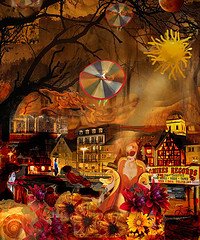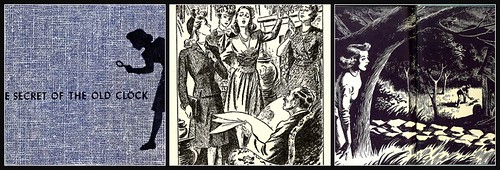Remember how those beigey pulp hardbacks from the school library used to smell? My nose was always in books, so it was a nice smell to have around.
Nancy Drew was the Katherine Hepburn of girl sleuths. A class act. Thanks to Carla216 on flickr for a great image.
Thursday, September 28, 2006
I wanted to be Nancy Drew when I grew up.
Courage and Fear and Penzey's Spice
In advertising, as in life, so many more possibilities present themselves when you're not being afraid all the ding-dang day. Courage, on the other hand, is what we all admire. It's what we respond to emotionally for better or worse.
Haven't we all managed to ignore the plain vanilla? Unless is Madagascar Bourbon Vanilla, then you've got Penzey's Spice. Ever gone in one of their stores? It's all wood and natural looking, but it's the smell. The smells. Each section assaults your senses. Never before have I been willing to spend so much money on spices. But Penzey's does something very interesting. It turns bottles of ground up plants into objects of desire. Spices strike a chord in the reptilian part of our brains. Just how many people set off into the great unknown in search of a Spice Route to the Far East? And why would they risk falling off the edge of earth but stuff like this:
Extra Fancy Vietnamese Cassia Cinnamon
The highest quality, strongest cinnamon available in America today. Extremely sweet and flavorful. Use 2 /3 what recipe calls for. Since the trade embargo with Vietnam has been lifted, this wonderful cassia has become available. Very high 6% grade. Ground, from Vietnam.
Penzey's is intent upon delighting its customers. For instance, they give away tasty recipes for nothing. Every big spice group has at least one free recipe.
Then there's their magazine-cum-catalog-cum-cookbook-cum-brilliantmarketing piece that's new each season. Delighting customers. That's the ticket.
Their people are good, too. Service, they've got down pat. No wonder, though, when their applications ask questions like, "What's your favorite spice or seasoning and how do you use it?" Which job that made the biggest impact on your life?
Think of the insightful, telling responses they get to this question in the "Education" secion:
Penzeys [sic] Spices is a growing company with an emphasis on comunications and visual arts. Tell us about your own background and experiences with the fine and performing arts.
Get outta town!
Here's another one:
Have you ever been convicted of a crime? (do not list minor traffic violations). If yes, please explain.
Here's a big ol' big business taking the risks involved to retain its humanity, actually presenting a willingness to listen to what really happened. Watched the news lately? They need a bit of the Gospel According to Penzey's.
Take the time to tell the truth. It's that truth that is the best thing you've got. Be bold and blunt. Show emotion, get personal, take risks. TAKE RISKS!
How else is anyone going to see your gorgeous self, let alone give you a chance at their business?
The thought process for clients is pretty predictable at this point. They freak out, and those little hairs on the back of their necks stands up, all the while they're bobbing their heads up and down in faux agreement.
Here's where everything clever gets cut. Like 500 units of Thorazine, right in the hip. It's been bought and paid for, but it's not doing its job.
Jim Asacker tells a story about the most common answer his favorite question, "What would you really like to do before you die." Skydiving. That's the most popular response. But how many people ever wind up skydiving? I call it Thorazine, he calls it awfulizing, but it's the same thing.
. . . Our brain thought about the skydiving scenario, awfulized the situation, made up the worst case scenario, believed it to be true, and then responded to what it believed to be true, as opposed to objective reality, which says that you probably won’t die as a result of skydiving. So the cost of what our brain made up, that we’d die, was greater than the benefit of feeling that incredibly free feeling of flying through the air, so therefore, we just decided not to do it, based purely on what our brain made up, as opposed to what was reality. So ask yourself this. What is the cost of changing? Remember to judge the cost of changing using objective reality, as opposed to what your brain is making up and awfulizing about the potential results of making this change. More often than not, when we take out all of the stuff our brain is making up, it’s much easier to see that the benefit of making the change far outweighs the cost.

So, what this really comes down to is people are weird. They don't always pay any attention at all to things like facts. We're emotional creatures. We are comforted by the status quo when that quo's bus has already left the station. As emotional creatures, though, we intuit great care, compassion and concern. We respond to authenticity, and that's what advertising should deliver.
Subscribe to:
Comments (Atom)
